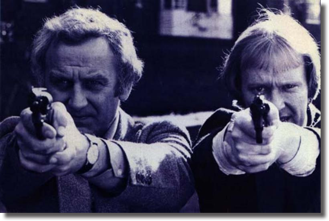Get yer trousers on, you're Tweeted.
 Soon the pounding, driving theme tune announces that The Sweeney, a gritty television police drama, is here. Jack Regan and George Carter are two world-weary, tough and cynical members of the Metropolitan Police's elite Flying Squad, dealing with armed robbery and violent crime.
Soon the pounding, driving theme tune announces that The Sweeney, a gritty television police drama, is here. Jack Regan and George Carter are two world-weary, tough and cynical members of the Metropolitan Police's elite Flying Squad, dealing with armed robbery and violent crime.
The Sweeney was the first programme to show more realistic police work. Scripts that didn't always supply a fairy-tale ending were a first for British TV. As well as a landmark TV drama, it also popularised a number of catchphrases and cockney rhyming slang. The programme's title is a derivation from Sweeney Todd, the demon barber. The show was eventually broadcast in more than 50 countries.
Success for our young lad (and his school friends) will mean that Tuesday playtimes are peppered with gems such as "Get yer trousers on, you're nicked."
Fast forward a few decades and I have my very own informant, a frontline Police officer. Like all good informants, I can't reveal his identity. Let's call him "Jack".
Jack is no ordinary cop, he's a Twitter cop. Spread around the country in a variety of roles, these police officers tweet their real life stories of police work on the @betterworkstory Twitter feed, giving a snapshot of the issues they face.
Our work on social media described how the Twitter cops give the public and potential recruits a glimpse into the realities of the job and increase the appeal of a police career. It's successful too: @betterworkstory has been nominated as one of the best Twitter accounts in the country.
Jack never dreamed that he would be doing this when he first joined the Police. That was when the station's one mobile phone was kept in a drawer and was rarely used. He thinks the Twitter cops are a sign of the rapid change that technology is bringing, embedding itself into all sorts of jobs.
Jack has been a Twitter cop for about two years, and he averages about 10 tweets a month. Some basic training and pointers about what makes a good Tweet were all it took to get him up and running. Because of the potentially serious and risky things that Jack can Tweet about, there are checks and balances built into the system through Police National HQ.
In Jack's previous role as a community police officer, he saw the kind of topics that interested, engaged, and energised the public. So he tries to use this experience whenever he thinks about a potential Tweet. Like we found with MetService, Jack is one of the Police's "hidden gems".
Jack thinks anonymity is crucial for all parties. As well as protecting him, the Police have a duty to respect other people's privacy and not trivialise their misfortunes.
The @betterworkstory Twitter feed aims to show the reality of Police life, but even this has to be a partial reality. There are just some things that are not suitable or appropriate to Tweet about, and Jack acknowledges that. Ongoing criminal cases, the aftermath of serious car crashes, and accidental deaths are subjects that Police officers encounter, but are inappropriate for Tweets.
Finding Tweet content isn't difficult for Jack; the job is a rich source of material. Jack shares stories that range from tragic, through sad, to interesting, funny and heart-warming. The reality of the job includes all these emotions. An earlier blog looked at social media content, but we were keen to hear the thoughts of a "pro". So what are the secrets of Jack's success?
First, reflect on your experience – don't keep churning stuff out. Pause and think about what worked well and what didn't. Over time, Jack has built up his own mental filters for what he does and does not Tweet about. Tweets should be unidentifiable; safeguard the Police's reputation; be professional but also personal.
Second, content is king! Content must be relevant to your audience and provide insight. Humour is always popular, but try to think outside the box. Tweets are an opportunity to educate the public about what the police do, the law, and Police processes. Tweets can be pro-active, reflecting areas of frequent public complaint. Tweets can change behaviour, by persuading people not to act in a particular way.
Third, be open and transparent. Abusive material should be moderated and deleted. But any material that challenges the Police constructively should be kept. Jack wants people to challenge the things that they think aren't right. Otherwise, he thinks the Police will lose the public's respect.
The Twitter cops might inhabit a different time, place, and medium from The Sweeney, but the intention is the same – to better reflect the realities of police life to their audience. Also, our now grown-up 10-year-old does a sweep of his lounge at TV watershed time, because you never know who may be hiding out!
